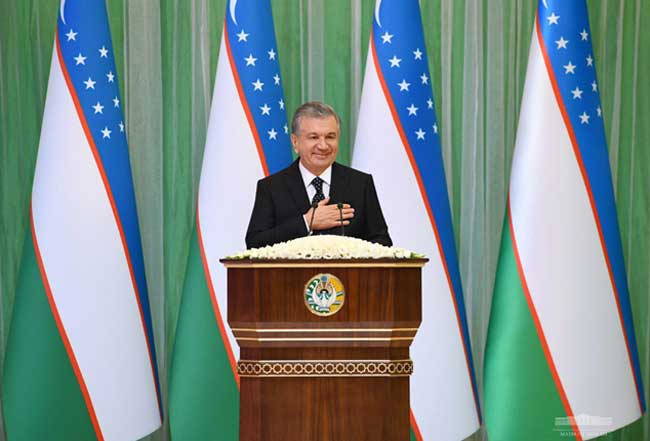
Uzbekistan, a Central Asian republic with ancient history and multiethnic society, is amidst big bang package of reforms for the past three years as the new Government headed by President Shavkat Mirziyoyev embarked on a mission of political and economic modernization of the nation.
This year on 1 September the country celebrated 28th anniversary of its Independence. Last week the people of Uzbekistan marked another important event – 27th anniversary of the country’s Constitution which was adopted on 8 December 1992.
Addressing the nation on this occasion President of Uzbekistan Shavkat Mirziyoyev underscored that the widescale reforms that have been lunched recent years in the country have become irreversible. The fundamental objective of the reforms in the country is building truly democratic society by ensuring the rule of law, good governance, freedom of speech, belief and conscience.
As further steps President Mirziyoyev highlighted the importance of creating an environment of legal awareness. “Constitution and rule of law are the guarantor of prosperous life and this notion should be deeply rooted in the minds and hearts of our citizens”, he said.
The President added: “If a minister or governor doesn’t understand the essence of the law and doesn’t show initiative to implement it into life, then it will be difficult to push for our reforms forward”.
Therefore, the President called for development of effective mechanisms for practical execution of laws. In this regard, the primary attention will be given to training personnel, distributing legal information, implementing standards to evaluate officials in terms of their legal knowledge and practice.
In addition, public control would play active role in ensuring rule of law. As it was put by President Mirziyoyev: “Today our public has woken up. People are learning to directly evaluate the work of officials and freely express their opinions”.
According to him, the public control is not only supervision over states bodies, but a self-governance method of society and also one of the important aspects of strengthening civil society.
Therefore, the Advisory Council for Civil Society Development, Center for Civil Society Development and National Association for Non-state Non-profit Organizations are tasked with elaborating an effective mechanism of exercising public control everywhere, first of all, in the spheres of law-enforcement bodies, finances, banking, education, healthcare, public utilities, energy and transport.
Another priority will be strengthening legal culture and knowledge of citizens. “Whatever perfect laws we draft, whatever reforms we carry out, if citizens don’t have legal knowledge and awareness, we cannot achieve the expected results”, he said.
On the other hand, cultivating legal culture raises feeling of responsibility of an individual. In this regard the President pointed out that some citizens request responsible attitude on the part of state bodies by forgetting about their own responsibilities and obligations before state, society and law.
In the meantime, raising the accountability of state officials before citizens remains a priority of the work of the Uzbek Government. Unique institutions function throughout the country – Public Reception Offices (PRO), which reports to the President’s Administration, have proved to be practical in ‘checking the pulse of the society’. Everyday hundreds of citizens enter the PROs to present their problems or proposals and every appeal is treated with due consideration by the state officials. For instance, in 2019 the PROs received close to 900 thousand appeals from citizens.
In his address the President Mirziyoyev repeatedly underscored the key significance of ensuring human rights in the reform processes which are underway in the country. The National Development Strategy of Uzbekistan for 2017-2021 also puts much focus on democracy and human rights.
The President informed that a continuous human rights education system will be implemented within the National Strategy, in particular by introducing “Human rights”, “Rights of the child”, “Women’s rights” special courses at schools, universities and centers of advanced training of personnel.
As part of the efforts for ensuring human rights and freedoms, laws “On private data”, “On protecting the victims, witnesses and other participants of a criminal proceeding” were adopted this year, the ILO’s Forced Labor Convention and Labor Inspection Convention were ratified.
For the past three years almost 10 thousand people were granted citizenship of Uzbekistan, 8 decrees were adopted on granting pardon to persons who committed crimes and over 4 thousand persons were released from penal facilities. On 27th anniversary of the Uzbek Constitution the President pardoned another group of 92 prisoners who have repented their wrongdoing and returned to the path of correction.
Furthermore, this year the Uzbek Government closed for good infamous ‘Jaslyk’ penal colony which for many years raised concern of international human rights organizations for its “inhumane conditions’. The European Union, United Nations and other international organizations welcomed the decision.
The Government of Uzbekistan also demonstrates firm commitment that it cares about the rights and well-being of its citizens not only in the country but anywhere in the world. In a quite significant move in 2019 the Uzbek authorities accomplished “Mercy-1” and “Mercy-2” humanitarian missions under which 261 Uzbek citizens, mainly women and children, have been returned to Uzbekistan from the conflict zones in the Middle East and Afghanistan.